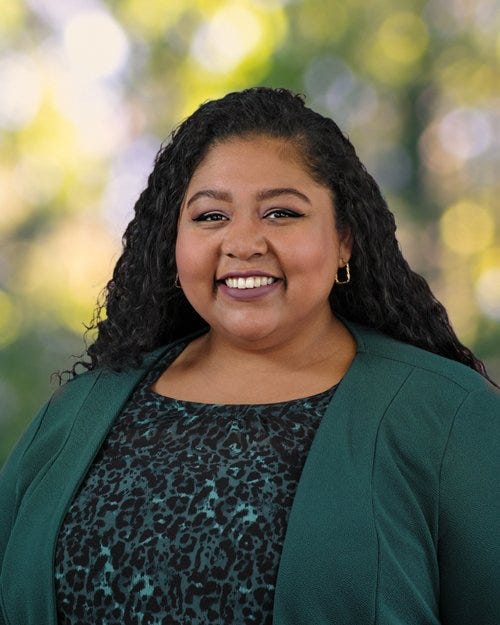Candace Avalos: "We can't let our guard down and take our eyes off charter reform."
The charter commissioner on what victory feels like, next steps for charter reform, and the dark underbelly of Portland's political Twittersphere.
Candace Avalos is a civic leader, a social media influencer, and a former City Council candidate.
She is also, as of November 8, a successful political reformer.
Along with nineteen other Portlanders, Avalos is an architect of the sweeping charter reform package passed by voters on election night.

On election night, photographer Michael Raines snapped a picture of Candace Avalos in tears, hugging fellow charter commissioner Becca Uherbelau.
The image, published in Willamette Week, captures the moment when charter reform supporters at an election watch party in northeast Portland learned that voters had passed the Charter Commission’s ballot measure.
“I just remember feeling relieved. It was like we all just exhaled,” Avalos tells Rose City Reform.
“All the hard work paid off. All those years, all those hours and all those long, difficult conversations. It all flooded me in that moment.”
A week after Portlanders’ historic vote to overhaul city government, Rose City Reform had a chance to catch up with Ms. Avalos.
In this interview, she talks about handing over charter reform to City Hall for implementation, her hopes going forward, and the steep price she’s had to pay for her relevance on Portland’s political stage.
Now that you’ve had some time to process what happened on election night, what’s going through your head?
As more ballots get counted, and our support numbers get higher, I feel a sense of security about our mandate from Portlanders.
But there are a lot of moving parts to this transition process. I'm watching really diligently to see who's going to do what and who's going to try to play some tricks. That’s inevitable in the world of politics.
We've got three commissions that will be formed to implement the measure. We’ve got a City Council with a newcomer who didn’t support the charter change. And we have current council members who actively campaigned against the change.
I'm hoping there's enough of a mandate and enough of a spirit of goodwill that we're going to give this reform package the chance it deserves.
You have raised concerns that City Commissioner Mingus Mapps might try to modify the Charter Commission’s proposal. Why?
Commissioner Mapps sent an email the day after the election. The tone of that email didn't ring to me like he was going to accept the will of the voters. It read to me like he still thinks he knows what’s best and he’s going to try to make sure that’s what happens in the transition.
That caused my alarm bells to go off. Portlanders voted for our proposal, and it deserves a good faith implementation effort without anyone trying to sabotage it with their continued belief that they know better than the voters.
So we definitely can't let our guard down and we definitely can't take our eyes off of it. That's the tension I feel right now. I'm excited. I'm happy. And I'm just – tense.
I think the way we wrote the charter ties the city's hands in a lot of ways, but we weren't over-prescriptive in the charter for a reason. We wanted the city to be able to decide how to operationalize this.
The most important thing to me is that the implementation is done by good faith actors that are willing to continue the will of the voters.
What are some elements of the implementation process that particularly matter to you?
That it’s understood that although we’re taking bureaus away from councilors, there’s still a lot of work for them to do. We want them to focus on constituent services, and to set a larger vision and policy agenda for solving our complex problems. That’s not a part time job.
I really hope that’s clear, and that the salary commission will decide to give them a reasonable wage, and not slash it in half. Slashing the salary would exclude a lot of people from being able to participate.
Another thing I'm very interested in is where everybody will be physically located. I’d love for the city to create a robust office for each district so that day-to-day operations can happen there. I'm curious how the role of City Hall might change. I think it makes sense for the mayor to stay at City Hall, but downtown isn’t a very accessible place for most people.
Lastly, I’m interested in the mayor’s announcement about bureau reorganization. Like a lot of people, I’m wondering why that didn’t happen earlier, but I do see those clusters of bureaus as translating into natural committees of the council.
I'm really curious how council can remain engaged with bureaus by way of committees that tackle overarching issues like utilities, service delivery, public safety, economic and housing development.
I hope we’ll see a City Hall that organizes itself to have tangible relationships between the executive and legislative branches.
You’re one of the most recognizable charter commissioners because you ran for office. That gives you a powerful platform, but it also makes you the subject of relentless online trolling. How has that affected you during this process?
People will tell you that it’s a compliment to have trolls and that it means you're doing something right. They’ll tell you to let it roll off your back because it's not worth your energy.
But when you're receiving it daily it does take a toll. It represents a larger societal problem with how we treat people, especially women of color, who try to be vocal change-makers in their communities.
I have chosen to be on social media because it’s a powerful tool to amplify issues. But I’ve had to resort to blocking accounts, because at some point I can only take so many accusations about how I'm a bad faith actor, a grifter, or someone who steals money from the city. Not only does it affect me personally, it affects my job, and it affects my relationships in the community.
If people aren't on Twitter, they may not realize how bad it is. I'm always willing to talk about it because I refuse to be silent about the harm it causes. It's not okay to be a recipient of racist, misogynistic hatred.
And for what? Because I'm on the Charter Commission? Because I want to put something forward to make the city better? Do I deserve that? Absolutely not.
Many people are wondering if you’ll run for office again. What do you tell them?
I subscribe to the mantra “right race, right time, and for the right reasons”.
Obviously, I want to see this succeed. I want the first new batch of councilors to have the right tools to accomplish what we envisioned.
I'm feeling really hopeful that people in my community will run who will be up for the task. So at the very least I’m trying to recruit people to run and help them through the process as somebody who has run before, and who helped write this new charter.
I’m committed to that. Whether I will do it myself, I don't know yet.
Follow Candace Avalos on Twitter at @candaceforpdx.
Trolling and intimidation affect many community leaders and volunteers in Portland, and not just on social media.
In 2020, when Ms. Avalos ran for City Council, she and others received racist death threats in their physical mailboxes.
Last week, at least two Black-led organizations in Portland received emails threatening election day violence from a self-described white supremacist group.
City presses play on charter reform implementation.
Last week, charter commissioners passed the baton to Michael Jordan, the city’s Chief Administrative Officer, whose office will lead the transition process toward a new government.
Jordan’s transition team will be guided by three community oversight and advisory groups:
An Independent District Commission to establish geographic districts.
A Salary Commission to set salaries for elected officials.
A Charter Transition Advisory Committee to advise on the overall process.
Mayor Wheeler will appoint all advisory group members, with approval from City Council. Speculations about who might try to steer the process in one direction or another have already begun.
In related news, Wheeler has unveiled plans to assign city bureaus grouped by service area starting in January 2023, a move he said would facilitate the transition process and knock down the “dysfunctional siloed bureaus that are a plague of our outdated commission form of city government”.





